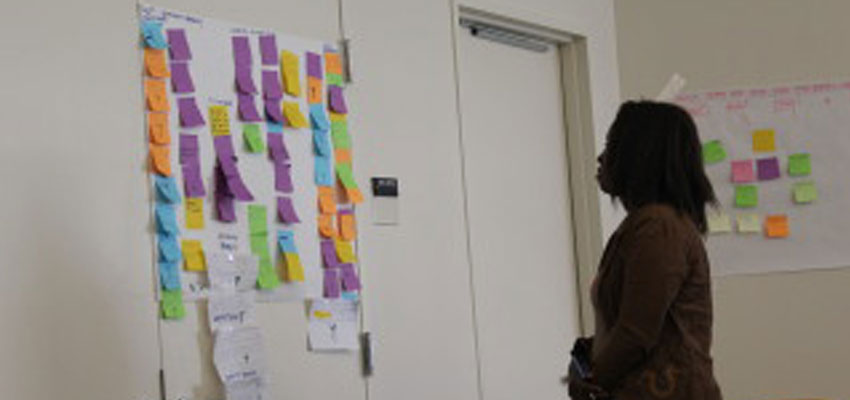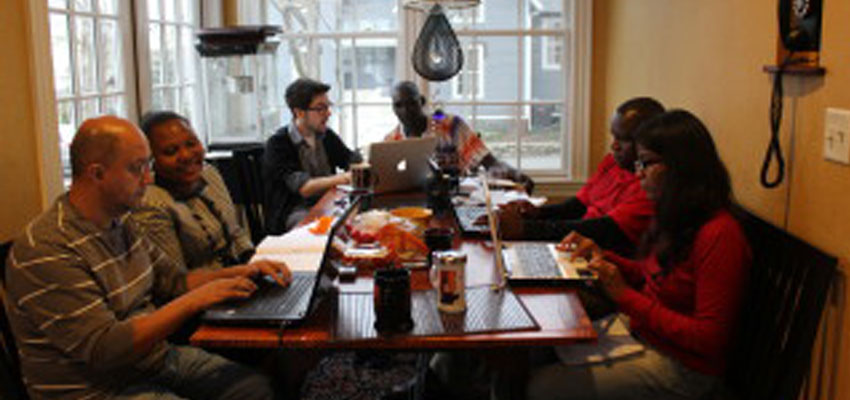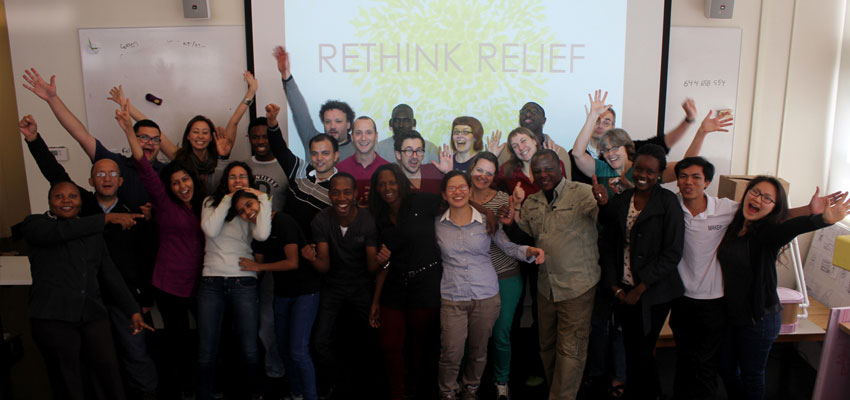
From April 14th-20th, D-Lab played host to this year's Rethink Relief conference, a collaboration between MIT's D-Lab and the Faculty of Industrial Design Engineering in Delft, Netherlands that is dedicated to the creation of technologies that bridge the gap between short-term relief and long-term sustainable development.
Christiane Kokubo, a participant in this year's conference and a journalist in Brazil, writes about her experience at this year's Rethink Relief - a conference about emergencies that was colored by the unfolding of Boston's own emergency.
__
And there we were. It was the third day of MIT D-Lab’s Rethink Relief conference, almost 9:30 in the morning, an we were all sitting. In front of us on the table were 4 straws, a sheet of paper, some tape, scissors, three elastic bands, two clips and some blue clay. Amy Smith explained the morning activity and 20 people, from 15 different countries, showed that inspiration can come even before breakfast, before talking to each other or before feeling really awake. “You have 10 minutes to make something useful with what you have in front of you,” Amy said.
What a challenge! Especially when your creation goes to someone else, who will have another five minutes to improve it, before they pass it to the next person, and the next. At the end of the activity, everyone explained the original idea and what happened to it. My crane mobile was improved by three people, including Amy, and came back to my hands much nicer than I could have made it myself in 10 minutes.

This activity was just a small piece of our week of intense discussion and work during Rethink Relief, which took place from the 14th to the 20th of April. The week saw 20 participants from 15 countries and a wide variety of backgrounds sharing experiences, creativity and stories - contributing to find solutions and to improve ideas.
Our groups were Water, Health, Protection, Economic Empowerment, Education and Energy, each of them with three-four people. Every day, all day long, dialogues in English, Spanish, Hindi, Creole, Dutch, Portuguese, French and Italian could be heard in the room. We were a melting pot of designers, engineers, computer specialists and a journalist, all together thinking about relief solutions for emergency situations.
And how strange was it then, when on the second day of the conference, two bombs exploded 1.6 miles away, and we bore witness to an emergency situation unfolding in front of us? The day before, many of us had gone to the finish line of the Boston Marathon and, as good tourists, had taken pictures of that place that would be in all the world’s papers the next day. Alberto Zerboni, an experienced architect from Doctors Without Borders (MSF), part of the Protection group, would tell me a couple of days later that he had never felt so threatened before, even after more than 12 years working for MSF in the field. He was at the finish line on Monday morning.
Scared as we could be during the week, the work went on. We talked a lot, a lot, a lot. And then, we talked some more. We laughed and made new good friends. We had participated in activities, we listened to experts, and we shared our own experiences. Our group defined what Protection meant for us, what solutions could lay in design, what kind of problem we were going to target, and what our mission statement was. The five other groups did the same.
We were anxious to talk about our work and accomplishments and to present our prototypes on Friday. And then, another emergency surprised us, now on this side of the Charles River. No subway, bus or taxi services were available. There was no possibility of going back to D-Lab. Authorities recommended that people did not leave their homes.

We were lucky enough to find a place on Friday outside of the city where most of us could gather together. Débora Leal, a Brazilian and one of the organizers of the conference, talked to her host family, who kindly opened their house to us. Thanks to the Mallons, we had a place to finish our week’s work. For Saturday, our plans changed once again, and the picnic that had been planned for the beach in Beverly was swapped for a day at D-Lab, where we would all get together to finish our presentations and show the results of our week’s work on emergencies.
I am sure that it was a transforming week for everyone. After leaving D-Lab on Saturday afternoon and saying goodbye to our new friends, we all went back home full of ideas, projects, contacts and good feelings, rethought and relieved. Good things are to come.

A version of this story appears in Folha de S.Paulo, a Brazilian newspaper. You can find that article (in Portuguese) HERE.

